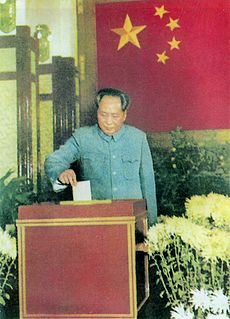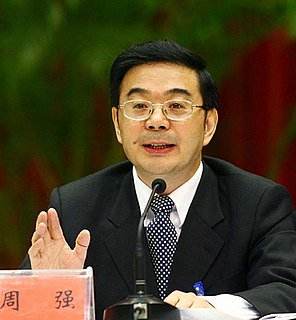Politics of Macau is a framework of political system, dominated by the People's Republic of China. It includes the legislature, the judiciary, the government, and a multi-party system. Executive power is exercised by the government, led by the Chief Executive.
The politics of the People's Republic of China takes place in a framework of a socialist republic run by a single party, the Communist Party of China, headed byGeneral Secretary. State power within the People's Republic of China (PRC) is exercised through the Communist Party, the Central People's Government and their provincial and local representation. The state uses Internal Reference, secret documents produced by Xinhua News Agency, similar to US' President's Daily Brief, though delivered to most of its officials according to level of secrecy of the information, a major source of information of the society.

The People's Bank of China is the central bank of the People's Republic of China responsible for carrying out monetary policy and regulation of financial institutions in mainland China, as determined by People's Bank Law and Commercial Bank Law. Valued at US$3.21 trillion, The People's Bank of China has had the largest financial asset holdings of any central bank in the world since July 2017. Though possessing a high degree of independence by Chinese standards, it remains a department of the State Council.

The Constitution of the People's Republic of China is nominally the supreme law within the People's Republic of China. The current version (fourth) was adopted by the 5th National People's Congress on December 4, 1982, with further revisions in 1988, 1993, 1999, 2004 and 2018. Three previous state constitutions—those of 1954, 1975, and 1978—were superseded in turn.

Law enforcement in China consists of an extensive public security system and a variety of enforcement procedures used to maintain strict order in the country and to suppress political dissent. Along with the courts and procuratorates, the country's judicial and public security agencies include the Ministry of Public Security and the Ministry of State Security, with their descending hierarchy of departments, bureaus, subbureaus, and stations

The Hong Kong Court of Final Appeal is the final appellate court of Hong Kong. It was established on 1 July 1997, when China resumed exercising sovereignty over Hong Kong, replacing the Judicial Committee of the Privy Council as the highest judicial institution under Hong Kong law. With its constitutional role defined in the Basic Law of Hong Kong, the Court of Final Appeal exercises its judicial powers independent of interference. The Hong Kong Court of Final Appeal Ordinance and the Hong Kong Court of Final Appeal Rules set out the functions and procedures of the court.

Elections in China are based on a hierarchical electoral system, whereby local People's Congresses are directly elected, and all higher levels of People's Congresses up to the National People's Congress, the national legislature, are indirectly elected by the People's Congress of the level immediately below.
Law of the People's Republic of China, officially referred to as the Socialist legal system with Chinese characteristics, is the legal regime of China, with the separate legal traditions and systems of Mainland China, Hong Kong, and Macau.

The origin of the current law of the People's Republic of China can be traced back to the period of the early 1930s, during the establishment of the Chinese Soviet Republic. In 1931 the first supreme court was established. Though the contemporary legal system and laws have no direct links to traditional Chinese law, their impact and influence of historical norms still exist.
The central government of the People's Republic of China is divided among several state organs:
- National People's Congress (NPC): the ultimate power of the state that supervise and elects all following organs;
- Standing Committee of the National People's Congress (NPCSC): the legislative branch;
- President and the Vice-President, who has no power itself, but exercise power by holding other offices;
- State Council : the executive branch, whose Premier is the head of government;
- Central Military Commission (CMC): the military branch, whose Chairman is the commander-in-chief of the national armed forces including the People's Liberation Army (PLA), the People's Armed Police (PAP), and the Militia;
- National Supervisory Commission (NSC): the supervisory branch;
- Supreme People's Court (SPC): the judicial branch;
- Supreme People's Procuratorate (SPP): the prosecutorial branch.
A basic people's court is a lowest level court in the Courts of General Jurisdiction in the People's Republic of China. According to the Organic Law of the People's Courts of the People's Republic of China, the basic people's courts handle the first instance cases at the local level.
A local people's court is a court at local level of the People's Republic of China. According to the Organic Law of the People's Courts, the local people's courts includes:

The judicial branch, organized under the constitution and law, is one of five organs of power elected by the People's Congress, in the People's Republic of China.

Zhou Qiang is a Chinese politician who is the current Chief Justice and President of the Supreme People's Court of China. Previously, he served as the secretary of the Communist Party of China Hunan committee, first-in-charge of the central Chinese province. He served as the province's governor between 2007 and 2010. Zhou also served as the First Secretary of the Communist Youth League of China between 1998 and 2006.

The National People's Congress is the highest organ of state power and the national legislature of the People's Republic of China. With 2,980 members in 2018, it is the largest parliamentary body in the world. The National People's Congress meets in full session for roughly two weeks each year and votes on important pieces of legislation. Members are considered to be part-time legislators and are not paid to serve in the NPC.

The constitutional oath of office of China was implemented on January 1, 2016 through a decision by the Standing Committee of the National People's Congress of China. The oath requirement applies to state civil servants elected or appointed by the National People's Congress and its Standing Committee at or above the county level.

National Supervisory Commission of the People's Republic of China is the highest anti-corruption agency of the People's Republic of China, at the same administrative ranking as Supreme People's Court and Supreme People's Procuratorate. Its operations are merged with the Central Commission for Discipline Inspection of the Communist Party of China. The National Supervision Commission was formed at the first session of the 13th National People's Congress in 2018. The Commission includes the director, deputy director, and ordinary members and the director is appointed by the National People's Congress.









